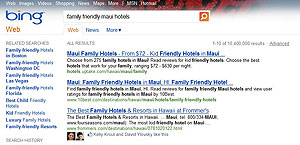REDMOND, Wash. — May 16, 2011 — Bing is adding 500 million new friends, and they’re all going to help the search experience become a lot more social.
Microsoft today announced new features in Bing that bring together Facebook and search to offer users personalized results based on the opinions of their friends. The new social features, which are available today, surface the stories, content and sites that their Facebook friends “like” right on the results page.
By marrying fact-based search results with the opinions of trusted friends, Bing aims to help people make better decisions, said Sean Suchter, general manager of Microsoft’s Search Technology Center in Silicon Valley.
“We partnered with Facebook to basically allow Bing users to bring their friends to search with them,” he said. “That means they’ll be able to make decisions not just with facts but with the opinions of their friends. With almost any task on Bing, if your friends can help you out we’ll bring them right there with you.”

Bing aims to help people make decisions by surfacing the stories, content and sites friends have “liked” right in the search results.
Suchter, who has worked in Web search since 1998, said today’s announcement marks a new chapter for search, which for more than a decade has been driven largely by facts and links. But that meant there were few opportunities to incorporate the single most important resource people turn to when they try and make a decision – their friends.
“How do you make decisions in the real world? By talking to your friends,” said Paul Yiu, group program manager at Microsoft’s Search Technology Center. “If I’m looking for a car, I ask a friend. If I’m looking for a restaurant, I ask my friends. So many decisions are made not just by ourselves but with our friends, and now we’re able to bring that into the search experience.”
Chris Pirillo, an industry expert on social media and founder of the online community network Lockergnome, thinks that Bing’s new features will change the way people make decisions online.
“When it comes to search, what you’re looking for is now always what everyone else is looking for, and sometimes results can really be thrown off,” he said. “Sometimes you have to rely on your friends to be that filter and help you judge the quality of one resource or another.”
The explosion of social media has made it easier for people to more finely tune their decisions by connecting with people they know and trust and seeking their opinion, he said. By bridging the gap between search and social, Bing could potentially help people make smarter decisions faster. “I think Bing’s new features are a first step in what likely will be a continuous series of enhancements to help you make better decisions when you search,” Pirillo said.
Facebook Likes Appear on Bing

Looking for recommendations in your destination city? Consult easily with friends who live near your travel destination.
Starting today, when Facebook users sign into their accounts and then perform a search on Bing, they’ll see relevant content from their social network appear in the results. That could be helpful in any number of scenarios, Yiu said. First and foremost, users will be able to leverage their friends’ likes to make decisions. Users might seek their friends’ opinion when trying to pick a hotel, for example. A search for Maui hotels might return an overwhelming list, but the “likes” of friends who took their own trips could help narrow it down.
When shopping for a new laptop, Bing could bubble up specific machines that Facebook friends “like” as well as sites and articles friends have found useful. Suchter said that feature would be helpful for someone like his mother-in-law. She’s not a techie, but she knows that Suchter is. If she saw that he “likes” the PC Magazine site, she would probably trust that result because it’s been vetted. “My recommendation is going to be a lot more meaningful to her than an expert she doesn’t know,” he said.
Yiu said the new social features also will enable users to get help from a much larger pool than their friends. Bing lets users tap into “the collective wisdom on the Web” by showing collective “like” results related to trending topics, articles, and Facebook fan pages. That means users can find popular content even when their friends might not have the right expertise, or they’re not exactly sure what they’re looking for. So if a user doesn’t have any friends who are into, say, celebrity news, they can still visit US Weekly’s site and see what articles other people are reading and sharing.
“It’s like hanging around a virtual water cooler,” Yiu said. “That’s a nice example of how Bing can help me browse and discover interesting stuff on the Web.”
He noted that all these scenarios were based on Facebook users’ willingness to share their perspective online. “The great thing about integrating ‘likes’ into search is the fact that we can make them helpful and useful in the context of a decision,” Yiu said. “As more people realize their likes are helping their friends, it’s possible we’ll change how people ‘like’ things online.”
To help encourage Facebook users to share their opinions, Microsoft also announced today the new Bing Bar, which includes the first universal “like” button that will make it easy for people to “like” any page on the Web.
Bing’s new social features can make search less of a passive experience and more of an active dialogue, Yiu said. For example, users can easily build, share and discuss shopping lists with friends and ask them to weigh in before they make a purchase. The updated Bing also makes it much easier to find people; when users are searching for a specific person, Bing will provide more in-depth bio snapshots, such as location, education and employment details to help them find who they’re looking for more quickly. Finally, Bing also is using more than just ‘likes’ to enhance the search experience – searching for a city or a plane ticket to a city tells you which of your friends lives there so you can get ‘local’ advice from one of your friends right within the context of search.
Untangling the Web
By letting users bring their friends along for a search, Bing will hopefully help them navigate a Web that’s growing increasingly unruly, said Stefan Weitz, a director in the Bing group. The sheer amount of information online is mindboggling. “From the dawn of recorded history until 2003, humans generated about 5 exabytes of data – that’s 5 billion gigabytes,” he said. “Today, we create that much every two days.” More than 30 billion pieces of content are shared each month on Facebook alone.

Sean Suchter, general manager of Microsoft’s Search Technology Center.
That sheer volume of information has posed problems for search. From a machine perspective, that ever-expanding amount of data becomes harder to process. But from a human perspective, it’s making it harder to make decisions.
Weitz said Microsoft spoke with social neuroscientists who talked about “decision quicksand” – how people get sucked into every decision they make because they’re confronted with so many choices.
“They were talking in the context of walking into the store and seeing 190 tubes of toothpaste,” he said. “The same thing holds true for search. Every query you do sends back millions of links. So we need ways beyond our visual organization and decision tools to help people and machines sort through the data.”
Microsoft and Facebook are betting that blurring the lines between social and search will help people better navigate information and make better decisions. According to a Microsoft survey, 90 percent of people turn to friends and family when they make a decision, Weitz said. They also found that 80 percent of people frequently delayed making a decision online to get input from their friends.
“That’s huge – eight out of 10 people online don’t complete their task until they can talk with someone,” he said. “We’re trying to close that gap – that we call ‘decision delay’ – by bringing the attitudes and opinions of friends to make a decision.”




